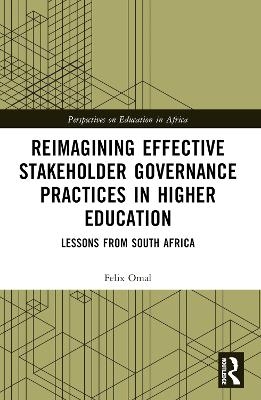
Reimagining Effective Stakeholder Governance Practices in Higher Education
Lessons from South Africa
Seiten
2024
Routledge (Verlag)
978-1-032-12031-7 (ISBN)
Routledge (Verlag)
978-1-032-12031-7 (ISBN)
This book examines the role of the university governing council and the changing nature of university governance using a case study from a South African university.
The book considers the key challenging features of South African higher education in relation to current competing international trends in higher education governance. It shows how major decision-makers within the university operate within competing governance knowledge domains to exercise good practice within turbulent institutional contexts. These diverse institutional cultures are examined in terms of their contribution to various governance practices, presenting an emerging model of university governance known as the structural–systemic–cultural model.
Throwing light on the nature of challenges associated with the governance of universities in the post-apartheid era, this book will be of interest to academics, researchers and postgraduate students in the fields of higher education, comparative education and education governance. Also, it will appeal to university councils and management across Africa.
The book considers the key challenging features of South African higher education in relation to current competing international trends in higher education governance. It shows how major decision-makers within the university operate within competing governance knowledge domains to exercise good practice within turbulent institutional contexts. These diverse institutional cultures are examined in terms of their contribution to various governance practices, presenting an emerging model of university governance known as the structural–systemic–cultural model.
Throwing light on the nature of challenges associated with the governance of universities in the post-apartheid era, this book will be of interest to academics, researchers and postgraduate students in the fields of higher education, comparative education and education governance. Also, it will appeal to university councils and management across Africa.
Felix Omal is Research Associate, Department of Curriculum Education Studies School of Education, University of Johannesburg, South Africa. He specializes in the politics of higher education.
1. Setting the scene 2. The unfolding of the higher educational institutional context 3. Debates about effective university governance 4. The rise of a dominant bureaucracy through the structures of the university council 5. The university council and its institutionalized university governance systems 6. Developing a responsive institutional culture with the university council 7. Emerging forms of effective university governance 8. Conclusion
| Erscheinungsdatum | 17.05.2023 |
|---|---|
| Reihe/Serie | Perspectives on Education in Africa |
| Zusatzinfo | 14 Tables, black and white; 4 Line drawings, black and white; 1 Halftones, black and white; 5 Illustrations, black and white |
| Verlagsort | London |
| Sprache | englisch |
| Maße | 156 x 234 mm |
| Gewicht | 520 g |
| Themenwelt | Sozialwissenschaften ► Pädagogik ► Allgemeines / Lexika |
| Sozialwissenschaften ► Pädagogik ► Bildungstheorie | |
| Sozialwissenschaften ► Pädagogik ► Erwachsenenbildung | |
| ISBN-10 | 1-032-12031-2 / 1032120312 |
| ISBN-13 | 978-1-032-12031-7 / 9781032120317 |
| Zustand | Neuware |
| Informationen gemäß Produktsicherheitsverordnung (GPSR) | |
| Haben Sie eine Frage zum Produkt? |
Mehr entdecken
aus dem Bereich
aus dem Bereich
Einführung in die Theorie transformatorischer Bildungsprozesse
Buch | Softcover (2023)
Kohlhammer (Verlag)
CHF 47,60
Eine Einführung
Buch | Softcover (2023)
Kohlhammer (Verlag)
CHF 49,95


